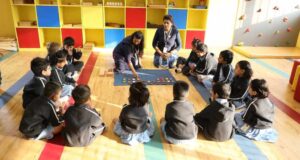In our fast-paced and interconnected world, being a master communicator isn’t just a skill – it’s a superpower that students can wield for success! Language skills aren’t just about words; they’re the key to unlocking ideas, making connections, and truly expressing ourselves. In a time where the internet shrinks distances and cultures come together, being a great communicator isn’t just a bonus—it’s a must-have skill. So, let’s dive into why language skills are like the secret sauce for students at Indian international schools. They’re not only essential for acing your studies but also for making friends, rocking future jobs, and being a part of the bigger global conversation.
Hold onto your hats because these language skills are like a passport to a whole new world, and it’s not just about acing exams. Think about it: classrooms today are like mini global villages, where everyone brings their unique flavors to the table. When you’re a communication champ, you can swap ideas, team up on projects, and present your thoughts like a boss. And guess what? Those skills don’t just vanish after school’s out. No, they’re the secret sauce for nabbing dream jobs too! Employers aren’t just looking for qualifications; they’re hunting for folks who can communicate fluently, write, and get their points across smoothly. So, by polishing up your language skills now, you’re not just getting ready for school success, you’re gearing up for a future where you can shine bright like a diamond, whether you’re talking to your colleagues, friends or sealing that deal. So, buckle up as we uncover the fantastic reasons why being a language expert is your ticket to personal growth and making a real mark in the world.
What is language learning?
Language learning is a vital educational endeavor that encompasses the acquisition of linguistic skills, cultural awareness, and cognitive development. Through the study of languages such as English, Spanish, French, Mandarin, and others, students embark on a journey to expand their conversation skills beyond their mother tongue. Language learning in schools typically involves a comprehensive curriculum that encompasses listening, speaking, reading, and writing skills. This multifaceted approach not only enables students to express themselves effectively but also fosters cross-cultural understanding and empathy by exposing them to different ways of thinking and living.
Furthermore, language learning offers numerous cognitive benefits to school students. It enhances memory, problem-solving skills, and critical thinking abilities as students navigate the intricacies of grammar rules, vocabulary, and sentence structures. Learning a new language also promotes mental flexibility, as students learn to switch between linguistic systems and adapt their communication style based on the context. Additionally, language learning in schools introduces young minds to the richness of literature, history, and art from diverse cultures, fostering a well-rounded and globally aware perspective. Overall, language learning for school students equips them with invaluable tools for personal, academic, and professional growth, enhancing their ability to thrive in an interconnected and multicultural world.
Why are language skills important for Students?
Language skills play a crucial role in a student’s overall development and success, both academically and personally. Here are nine key points explaining the importance of language skills for students:
1. Building strong Communication skills: Effective communication is at the core of human interaction. Language skills enable students to convey their thoughts, ideas, and feelings clearly and confidently. This proficiency enhances their ability to participate actively in discussions, ask questions, seek clarification, and share their perspectives. In both academic and social contexts, strong communication skills foster positive relationships and facilitate cooperation.
2. Academic Achievement: Language is the primary medium through which knowledge is imparted and assessed in educational settings. Proficient language skills are essential for comprehending lectures, understanding textbooks, and engaging with educational materials across subjects. Whether solving math problems, dissecting historical events, or conducting scientific experiments, students need language skills to grasp, synthesize, and communicate complex concepts effectively.
3. Develop Critical Thinking abilities: Language skills are intimately linked to critical thinking and reasoning. Students with strong language abilities can analyze, evaluate, and interpret information more effectively. They can dissect arguments, identify logical fallacies, and form well-founded opinions. These skills empower students to engage in meaningful debates, make informed decisions, and approach problem-solving with a discerning mindset.
4. Vocabulary and Word Usage: A robust vocabulary allows students to select the precise words to express their thoughts. This not only makes their communication more engaging and impactful but also enables them to convey subtle nuances and distinctions. By expanding their vocabulary, students can articulate ideas more precisely and creatively, enhancing the quality of their writing and oral expression.
5. Strengthening Reading Comprehension: Proficient language skills are a cornerstone of reading comprehension. When students can understand and interpret written material accurately, they can extract key information, identify main ideas, and discern supporting details. This skill is vital for success across subjects, as students encounter diverse texts, from scientific articles to literary works, throughout their academic journey.
6. Enhancing Writing Proficiency: Writing is a fundamental mode of academic expression. Strong writing skills enable students to communicate complex ideas coherently, logically, and persuasively. Whether crafting essays, reports, research papers, or creative pieces, students with well-developed writing abilities can structure their thoughts effectively, showcase their understanding, and present compelling arguments.
7. Research Abilities: In an information-rich age, research skills are paramount. Language skills aid students in conducting comprehensive research, enabling them to locate, evaluate, and synthesize information from various sources. Proficient language use also extends to proper citation and referencing, ensuring that students give credit to the ideas and work of others while building their own scholarly contributions.
8. Problem Solving skills: Effective problem-solving often involves collaboration and clear communication. Students with strong language skills can articulate their thought processes, share ideas, and seek assistance from peers and teachers. This collaborative approach fosters a supportive learning environment where students can collectively brainstorm, analyze challenges, and devise innovative solutions.
9. Cultural Awareness: Language is intertwined with culture, and learning languages or exploring diverse literary traditions exposes students to different worldviews and perspectives. Language skills enable students to engage with literature, films, and other forms of cultural expression from various regions, fostering empathy, tolerance, and a broader understanding of global diversity.
The power of communication & it’s importance
The power of communication for students lies in its capacity to enrich academic experiences, foster meaningful relationships, and prepare them for future professional endeavors. It equips them with the ability to navigate the complexities of the modern world and sets the stage for personal growth and professional achievements. By honing their communication skills, students equip themselves with a versatile tool that not only aids in their studies but also lays the groundwork for success in various aspects of life. Here are five key points highlighting the power and significance of communication for students:
1. Academic Excellence: Strong communication skills enhance students’ academic performance. Clear and articulate expression of ideas in assignments, presentations, and discussions helps convey their understanding of subjects and earns them higher grades. Effective communication also aids in asking questions and seeking clarification, leading to a deeper grasp of concepts.
2. Building Relationships: Communication is essential for forming friendships, collaborating on group projects, and connecting with peers and teachers. Students who communicate well are more likely to establish supportive networks that contribute to a positive and enriching educational experience.
3. Future Career Success: Regardless of their field, students will enter a workforce where effective communication is paramount. Whether writing emails, participating in meetings, or delivering presentations, the ability to convey ideas clearly and persuasively is crucial for professional advancement.
4. Confidence and Self-Expression: Proficient communication empowers students of CBSE school admission to express themselves confidently. It allows them to share their thoughts, opinions, and creative ideas without hesitation, nurturing self-assurance and self-awareness. This skill becomes a foundation for personal growth and resilience.
5. Empowerment and Advocacy: Communication power allows students to voice their opinions, advocate for their rights, and effect positive change. It plays a vital role in promoting social justice, inclusivity, and equality by allowing marginalized voices to be heard and encouraging collective action for a better society.
How is language learning helpful for communication?
Language learning offers a wide range of benefits that enhance communication and provide a deeper understanding of the world around you.
1. Cross-Cultural Communication: Learning a new language enables you to engage with people from diverse backgrounds. When you’re able to communicate in their language, it shows respect and willingness to bridge the gap between cultures. This skill is especially valuable when traveling or working in multicultural environments, as it helps you connect with locals and form meaningful relationships.
2. Enhanced Language Skills: Acquiring a new language forces you to analyze the structure, grammar, and vocabulary of both the target language and your native language. This comparative analysis sharpens your grasp of linguistic nuances, making you a more effective communicator in your mother tongue as well. You become attuned to language intricacies, which in turn improves your writing, speaking, and listening abilities.
3. Cultural Insight: Language and culture are intertwined. By learning a language, you gain insights into the cultural norms, values, and practices of the people who speak it. Different languages have unique idioms, expressions, and ways of conveying ideas. Understanding these nuances not only prevents misunderstandings but also grants you a more profound comprehension of the culture’s perspective and worldview.
4. Cognitive Benefits: Learning a new language is a mental workout that engages various cognitive functions. It enhances memory as you remember new words and grammatical rules. Problem-solving skills improve as you navigate complex language structures. Additionally, language learning stimulates creativity by encouraging you to express ideas differently and think in novel ways. Studies have shown that bilingual individuals exhibit greater cognitive flexibility and adaptability.
5. Professional Advantage: In today’s globalized world, businesses and organizations often operate on an international scale. Being proficient in multiple languages can set you apart in the job market. It allows you to communicate directly with clients, partners, or customers who speak different languages, potentially expanding your professional network and opening doors to international opportunities.
Here are few specific examples to help provide better clarity
● If you are traveling to a foreign country, learning the local language will help you to communicate with locals and get around more easily.
● If you work in a multinational company, learning the languages of your colleagues will help you to collaborate more effectively.
● If you are interested in studying a particular culture, learning the language of that culture will give you a deeper understanding of it.
The End Note
Communication is the foundation of all human interaction. It is how we share our thoughts, ideas, and feelings with others. In today’s globalized world, the ability to communicate effectively is more important than ever.
For students, strong language skills are essential for success in school and beyond. They help students to participate in class discussions, write clear and concise essays, and give effective presentations. They also help students to learn about other cultures and to build relationships with people from different backgrounds.
There are many ways to improve language skills. Students can read books and articles in different languages, watch movies and TV shows in other languages, and listen to music in other languages. They can also take language classes, join language clubs, and travel to countries where the language is spoken.
The benefits of strong language skills are numerous. Students with strong language skills are more likely to succeed in school, get better jobs, and make a positive contribution to society. They are also more likely to be well-rounded individuals who are open to new experiences and cultures.
Therefore, we strongly encourage all students to make the effort to improve their language skills because it is an investment that will pay off in many ways.
FAQs
What is the most important language of communication?
The most important language of communication is the one that is most widely spoken and understood by the people you need to communicate with. In today’s globalized world, English is often seen as the most important language of communication. This is because it is spoken by over 1.5 billion people worldwide, and it is the language of international business, diplomacy, and education.
Why is language the most powerful tool for communication?
Language is considered the most powerful tool for communication because it enables the transmission of complex ideas, emotions, and information between individuals. It provides a structured and systematic way to convey thoughts, beliefs, and experiences. Through language, humans can express abstract concepts, share their perspectives, and engage in nuanced interactions. Unlike other forms of communication in the animal kingdom, human language allows for a virtually limitless range of expression, making it an incredibly versatile and potent means of connecting and understanding each other.
What is the relationship between language and communication?
Language and communication are closely intertwined concepts. Language serves as a system of symbols and rules enabling us to convey thoughts and emotions, while communication involves the exchange of information between individuals. Essentially, language acts as a tool for communication, allowing us to share experiences and solve problems, and communication, in turn, utilizes language to achieve specific goals like sharing information or fostering connections. Both language and communication shape each other: language is molded by how we communicate, and communication is influenced by the language we use. Together, they form the foundation of human interaction, whether through speaking, listening, reading, or writing, enabling us to connect and express ourselves.
Is communication possible without language?
Yes. Communication can indeed occur without language through various nonverbal means. Body language, facial expressions, and gestures convey emotions and intentions effectively. For instance, a smile or a thumbs-up can speak volumes without words. These nonverbal cues help us understand each other’s feelings and desires, building strong connections. Additionally, art and music serve as potent forms of communication, allowing us to share emotions and ideas, even transcending language barriers. While language is a powerful tool, nonverbal communication and creative expressions play vital roles in connecting people across cultures and conveying messages beyond words.
What is the purpose of communication?
Communication is how people share information, thoughts, and feelings. It can be talking, writing, or even gestures. There are different purposes and reasons for communication. We do it to tell facts or ideas (like a teacher explaining an assignment), to convince others (like a politician asking for votes), and to get closer to people (like friends sharing stories). Communication also helps solve problems when people talk and find solutions (like co-workers fixing a work issue). Plus, it’s used to make people laugh or enjoy themselves (like comedians telling jokes).
Besides these, communication helps us understand each other better, learn new things from others, and express our own feelings. It’s like a tool for building relationships and growing as individuals. So, communication is essential for connecting with others and making our lives richer.































